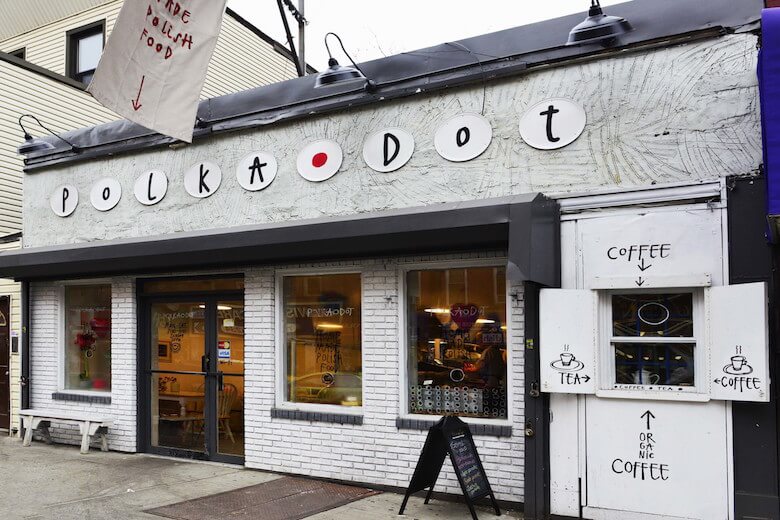
The changing scenery in Greenpoint can feel a little jarring from one day to the next, as dusty food joints shutter their windows and, seemingly overnight, reincarnate into modern eateries that court the neighborhood’s shifting palate. In the center of it all, a few steps from the Nassau Avenue G station on Manhattan Avenue, one Polish café stands out as a bridge between historical “Little Poland” and the influx of a new generation of Greenpointers.
“I have always loved Polish food and I couldn’t live without it,” says Polka Dot Café‘s owner, Marzena Parys, who took over the business 13 years ago after her husband passed away. “I try to cook traditional food, but we are also open to new things—new recipes for a new generation.” Parys tells me that she welcomes the wave of young professionals moving into the area and believes that young people “value traditional stuff if it comes from a good tradition. I think if something is really, truly good, it will always last.”

Founded in 1996, the business started as a butcher shop, Poleski Meat Market, run by Parys’s husband and his all-male staff. Since taking the helm in 2003, Parys slowly adapted the deli and café to suit her own tastes, and to keep in step with the neighborhood’s changing demand. “I don’t like too much meat, so day by day I changed the menu and cooked more vegetables,” she explains.
Now a staff of nine multi-generational Polish women prepare 30 different dishes each day, ranging from traditional fare to modernized recipes. The long glass counter teems with colorful salads and vegetable-forward creations made from scratch, like mushroom and sauerkraut pierogies, vegetarian stuffed cabbage with rice and barley, and zucchini pancakes, along with a host of meaty dumplings and cutlets. Parys says the menu varies based on customer requests, and the mostly organic produce is sourced locally. “The customer decides what we do, truly. The neighborhood pushed me that way,” she tells me. “I listen to what people want, and if they like it, we stay with it. If they don’t like something, no more.”
Last year, with the help of customers, friends and family, Parys rebranded her business and repainted the building overnight, transforming the old deli into a cozy space with a simple style mirrored after her grandmother’s kitchen in Lublin, Poland. Before the rebranding, the café had been sitting nameless. “I knew I didn’t want ‘Poleski Meat Market’—I never liked it— so it was for a long time without a name,” Parys explains. “One customer came and asked, ‘Do you have the new name?’ and I said, ‘No, we don’t.’ Then she came again and said, ‘Do you like Polka Dot?’ And I loved it! She said, ‘If you like it, you can use it.’”
Located across the street from the famous Peter Pan Donut & Pastry Shop, where the line extends out the door and down the block most weekends, Polka Dot exudes its own distinct charm that stems from a fresh aesthetic rooted in simplicity. Above the entrance to the café, a white banner with a squiggly red font reads, “Homemade Polish food,” and potted geraniums flank the walk-up window boasting organic coffee and tea—one of the few in the neighborhood.
Inside, a cluster of tables and chairs invite patrons to sit down and relax, sip on a glass of house-made kombucha and enjoy the free wi-fi. The café offers locally made bread from Syrena Bakery, plus a cold section of ready-made soups and to-go beverages, but the real gem is hidden back in the kitchen: a large crock of fermenting sauerkraut. Parys found the crock in her mother’s basement while she was visiting family in Poland last year, and flew it back with her for the purpose of making kraut in-house. “It was so heavy,” she laughs.
Looking around the interior of the café, Parys points to gifts she has received from friends and patrons since the renovation. “My friend gave me this horseshoe for good luck,” she beams, pointing above the glass door. Another friend helped with the woodwork. “I had a lot of support starting out. As I was making changes, everyone told me, ‘You’re doing a good job’ or ‘Yes, we like this.’”
Hanging on an adjacent wall is a sign she bought from a local artist in New Orleans that playfully reads, Be Nice or Leave. The same exact sign hangs in my apartment a few blocks away, where jars of kombucha and sauerkraut thrive—though much smaller than those found in Polka Dot. Perhaps Parys is right in her hunch that some things, if truly good, survive the test of time and span the tastes of generations, old and new.



